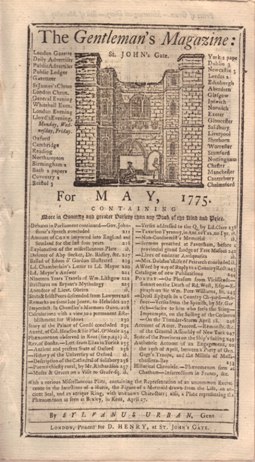“In Provincial Congress, Watertown,
April 26, 1775.
To the Inhabitants of Great Britain:
Friends and fellow-subjects: Hostilities are at length commenced in this Colony by the Troops under command of General Gage; and it being of the greatest importance that an early, true, and authentick account of this inhuman proceeding should be known to you, the Congress of this Colony have transmitted the same, and from want of a session of the honourable Continental Congress, think it proper to address you on the alarming occasion.
By the clearest depositions relative to this transaction, it will appear that on the night preceding the nineteenth of April instant, a body of the King’s Troops, under command of Colonel Smith, were secretly landed at Cambridge, with an apparent design to take or destroy the military and other stores provided for the defence of this Colony, and deposited at Concord; that some inhabitants of the Colony, on the night aforesaid, whilst travelling peaceably on the road between Morton and Concord, were seized and greatly abused by armed men, who appeared to be officers of General Gage’s Army; that the Town of Lexington by these means was alarmed, and a company of the inhabitants mustered on the occasion; that the Regular Troops, on their way to Concord, marched into the said Town of Lexington, and the said Company, on their approach, began to disperse; that notwithstanding this, the Regulars rushed on with great violence, and first began hostilities by firing on said Lexington Company, whereby they killed eight and wounded several others; that the Regulars continued their fire until those of said Company, who were neither killed nor wounded, had made their escape; that Colonel Smith, with the detachment, then marched to Concord, where a number of Provincials were again fired on by the Troops, two of them killed, and several wounded, before the Provincials fired on them; and that these horrible measures of the Troops produced an engagement that lasted through the day, in which many of the Provincials, and more of the Regular Troops, were killed and wounded.
To give a particular account of the ravages of the Troops as they retreated from Concord to Charlestown, would be very difficult, if not impracticable; let it suffice to say, that a great number of the houses on the road were plundered and rendered unfit for use; several were burnt; women in childbed were driven by the soldiery naked into the streets; old men, peaceably in their houses, were shot dead; and such scenes exhibited as would disgrace the annals of the most uncivilized Nation.
These, brethren, are marks of ministerial vengeance against this Colony, for refusing, with her sister Colonies, a submission to slavery. But they have not yet detached us from our Royal Sovereign. We profess to be his loyal and dutiful subjects, and so hardly dealt with as we have been, are still ready, with our lives and fortunes, to defend his person, family, crown, and dignity. Nevertheless, to the persecution and tyranny of his cruel Ministry we will not tamely submit; appealing to Heaven for the justice of our cause, we determine to die or be free.
We cannot think that the honour, wisdom, and valour of Britons will suffer them to be longer inactive spectators of measures in which they themselves are so deeply interested; measures pursued in opposition to the solemn protests of many noble Lords, and expressed sense of conspicuous Commoners, whose knowledge and virtue have long characterized them as some of the greatest men in the Nation; measures executing contrary to the interest, Petitions, and Resolves of many large, respectable, and opulent Counties, Cities, and Boroughs, in Great Britain; measures highly incompatible with justice, but still pursued with a specious pretence of easing the Nation of its burden; measures which, if successful, must end in the ruin and slavery of Britain, as well as the persecuted American Colonies.
We sincerely hope that the great Sovereign of the Universe, who hath so often appeared for the English Nation, will support you in every rational and manly exertion with these Colonies, for saving it from ruin; and that in a constitutional connection with the Mother Country, we shall soon be altogether a free and happy people.
Per order: Jos. Warren, President pro tem.”
Source: Peter Force, American Archives, Fourth Series, Volume II, Pages 487-488
Commentary: Joseph Warren assured that the Patriot account of the outbreak of fighting at Lexington and Concord on April 19, 1775, preceded arrival in Great Britain of Governor General Thomas Gage’s official version of events. It was widely quoted and reprinted in British newspapers. While it was a propaganda coup to be first to get the news to the English public, and embarrassing to the Ministry and to the British Army, Warren did not achieve what he and other Patriot leaders might well have desired most – that the news of hostilities, and of repugnant suppression by force of English liberties in North America, would galvanize sympathetic British Whigs in Parliament to rescind the Intolerable Acts and to effect an eleventh hour reconciliation between mother country and restive colonials.

 Follow
Follow